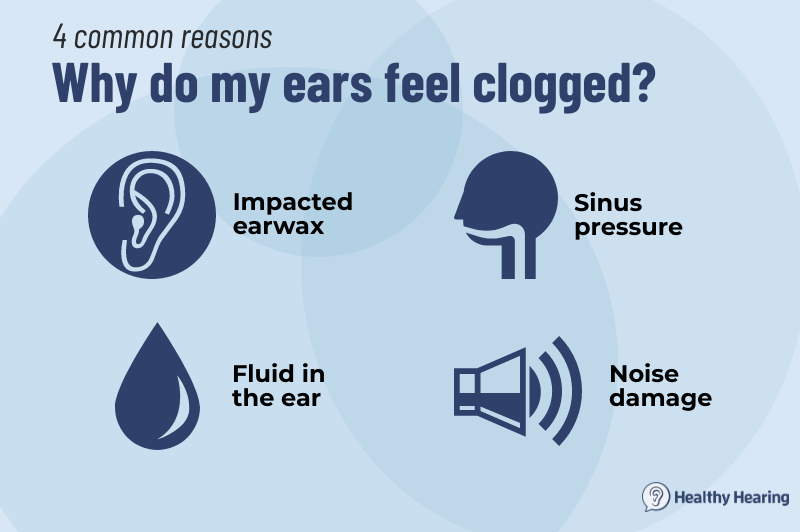Key points:
-
In springtime, weather changes and allergies can cause clogged ears, ear pain and muffled hearing.
-
People with Meniere's disease and tinnitus are especially prone to increased symptoms associated with spring weather changes.
-
If you wear hearing aids, make sure to clean them regularly and keep them dry. Humid weather and pollen can clog the ports.
While spring brings longer days and warmer weather, it also brings erratic temperature shifts and seasonal allergies that can affect your ears and hearing.
Seasonal allergies and ear congestion
Seasonal allergies are incredibly common. About one-quarter of adults and one-fifth of kids have seasonal allergies, according to the US Centers for Disease Control and Prevention.
While most people think of allergy symptoms as sneezing and sinus pressure, it is important to remember that the ears and sinuses are interconnected. When your allergies flare up, you can also experience stuffy or clogged ears.
"People take it for granted that allergies cause sneezing in the nose and itching in the eyes. Yet they seem surprised to learn [that] allergies inevitably affect their ears as well," said Dr. Ronna Fisher, Au.D.

hearing in several ways.
Blame pollen
Trees produce more pollen in springtime. For those who are allergic to pollen, their immune system reacts by producing antibodies. Those antibodies release a substance called histamine, which causes inflammation in the sinuses and increases mucus production.
This combination of swelling and increased mucus causes the eustachian tubes to become clogged, and is known as eustachian tube dysfunction.
Not only can this result in a feeling of fullness and pressure in the ears, but it can also lead to temporary allergy-related hearing loss as well.
Weather changes can cause ear pain and fullness
It's not just allergies that can affect your ears this time of year. The rapid shifts in barometric pressure that come with spring thunderstorms and ever-changing weather can make your ears feel clogged and sometimes, even cause ear pain.
When the barometric pressure drops rapidly, the pressure outside your ears goes down before the pressure inside your ears can acclimate. This causes a pressure imbalance, which can lead to sensations of fullness and popping in the ears, similar to when you're flying or driving up a steep incline.
Since allergies can already cause a narrowing of the eustachian tubes, people with seasonal allergies may feel these changes more strongly.
Looking for help? Check out our directory of local hearing clinics.
Meniere's disease symptoms may worsen
People with Meniere’s disease in particular can suffer greatly during spring weather changes and experience an increase in attacks.
Meniere's causes an overproduction of ear fluid, which can back up under the increased pressure and causes the endolymphatic chambers (structures in your ear that regulate pressure) to bulge.
The result is discomfort, fullness and pressure along with the potential of other unpleasant symptoms such as:
- Hearing loss
- Tinnitus
- Vertigo and/or dizziness
In fact, one study found an increase in tinnitus-related emergency visits when there was low atmospheric pressure and high humidity.
How to cope with stuffy ears

If allergies or weather changes are causing your clogged ears, there are several remedies can help relieve your symptoms, including:
- Over-the-counter or prescription antihistamines (Claritin, Allegra, etc.)
- Decongestants
- Nasal sprays or rinses
Some other remedies that can reduce fluid build-up and/or help open up your ear include:
- Putting a warm compress over your ear (or ears) for 10-15 minutes
- Inhaling steam
- Yawning or chewing gum
- Exercising
- Eating a low-sodium diet
- Staying hydrated
- Eating fruits and vegetables that act as diuretics, like grapes, watermelon, celery, bell peppers and asparagus
Remember that these are general suggestions, and may not work for everyone. For example, decongestants may not be safe for people with high blood pressure or other heart conditions. Always ask your doctor about possible interactions before taking any over-the-counter or prescription medications.
How spring weather affects your hearing aids
Spring also brings challenges for those with hearing aids. The rise in allergens and wet weather means paying closer attention to maintenance and upkeep of hearing devices.
For example, increased allergens can clog microphone ports in hearing aids, so be sure to clean hearing aids regularly and replace covers of mic ports when necessary.
Increased allergens can clog microphone ports in hearing aids, so be sure to clean hearing aids regularly.
Along with allergens, spring is accompanied by heat, humidity, rain and extreme temperature changes. Moisture is the enemy of hearing aids, as it can build up in the tubing, damage the microphone and receiver and cause static. In addition, warm weather means more earwax build-up, which can clog the sound openings.
Protect your hearing aids
There are several ways to keep your hearing aids working properly this season.
- Wear a hat or use an umbrella when going out in the rain.
- Maintain a regular hearing aid cleaning routine.
- Use a hearing aid dehumidifier overnight or anytime your hearing aids are exposed to excess moisture.
Can ear pressure cause permanent hearing loss?
While hearing loss from pressure changes is often temporary, in rare cases continuous pressure in the middle ear could result in permanent hearing loss. This happens when prolonged exposure to pressure damages the delicate structures of the inner ear such as the cochlea.If you are experiencing persistent stuffy ears you should visit an ENT or hearing specialist to make sure the problem isn’t something more serious. It's particularly important to seek help if you have additional symptoms such as dizziness, hearing loss or ear pain.
Get help for your hearing loss
Spring allergies and weather changes can be hard on your ears, but help is available. If you're experiencing hearing problems or other ear-related issues, be sure to see a hearing healthcare professional so you can enjoy the beautiful sounds of springtime for years to come.
The above is the interpretation of Spring Allergies and Hearing Aids: A Survival Guide provided by Chinese hearing aid supplier Shenrui Medical. Link https://www.srmcm.com/Blog/Spring_Allergies_and_Hearing_Aids_A_Survival_Guide.html of this article is welcome to share and forward. For more hearing aid related information, please visit Blog or take a look at our Hearing aids products















